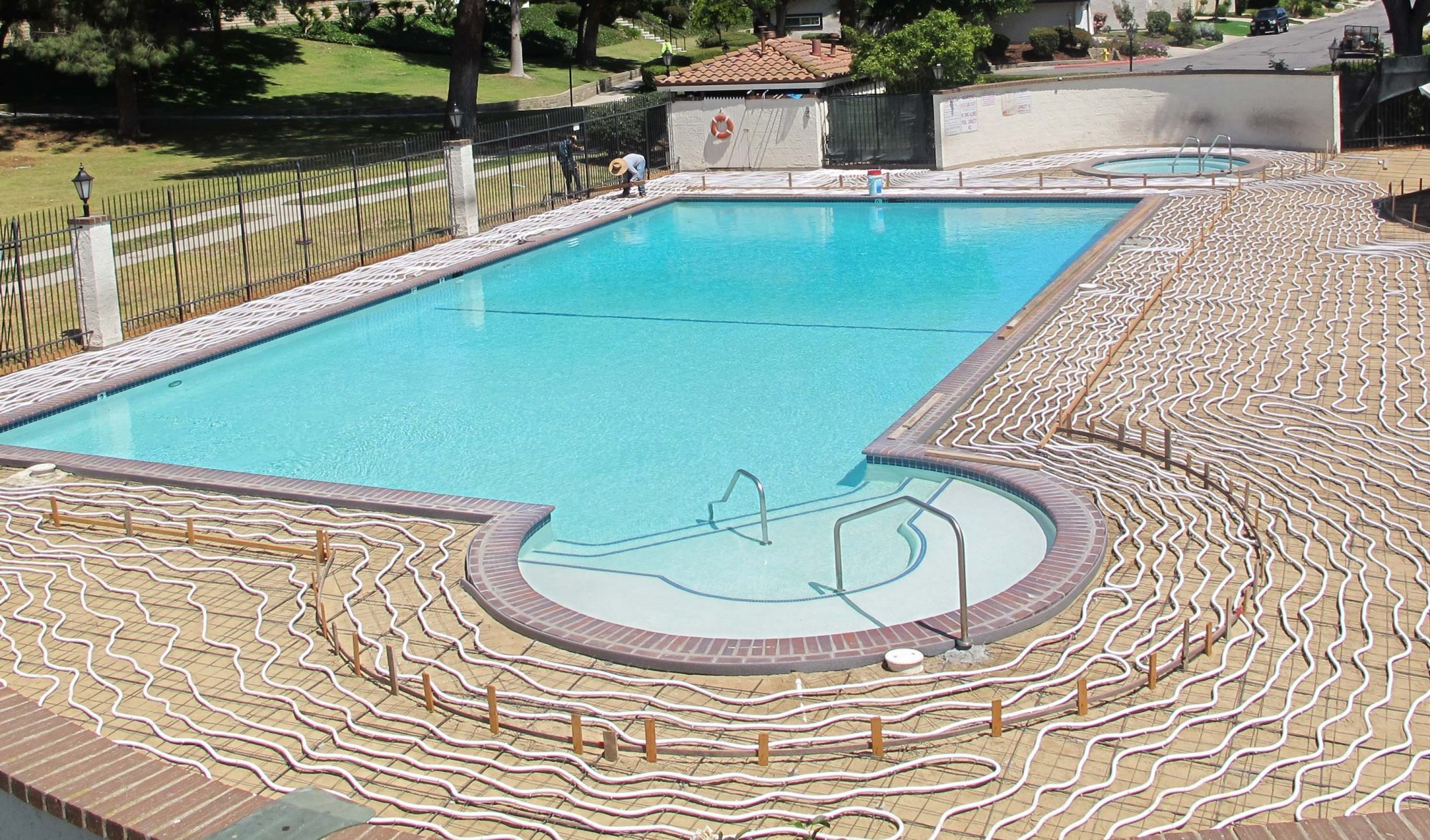Ok, so I have read all the posts about the hotspot FPH heat exchanger and I am intrigued. But I am not sure if it is worth the extra cost and headache. I am in Nebraska so I really just want to extend my season. But at the time I would want to extend my season I would use my AC a lot less than I would want to heat my pool. So I would still have to have some backup heat pump or NG heater. As I look at how pool heat pumps are made, it seems as if the heat exchanger within a heat pump is almost exactly the same as the heat exchanger unit for the FPH. If I am totally wrong, please help me out. Why couldn't an AC unit be directly connected to a heat pump heat exchanger? I am guessing this would end up a more complicated system to control? If the AC is running AND the water is cold, run the heat out to the heat pump exchanger. If the AC is running but the pool is at temp, run the AC as normal. If the pool needs heat but the AC isn't running, then run the heat pump as normal. I am currently in planning stages of both building a house and a pool at the same time so I am just looking at options.
Theoretical pool heat pump, home AC combo?
- Thread starter har02052
- Start date
You are using an out of date browser. It may not display this or other websites correctly.
You should upgrade or use an alternative browser.
You should upgrade or use an alternative browser.
- Jul 3, 2013
- 9,027
- Pool Size
- 15000
- Surface
- Vinyl
- Chlorine
- Salt Water Generator
- SWG Type
- CircuPool SJ-40
Welcome to TFP 
I am putting my solar heating in the deck.. I checked my concrete temp in mar when it was 60 degrees out and my deck was almost at 90 to 100 degrees... it only uses electricity to run the pump and water through the solar deck... get a digital thermometer and check the concrete temps around you for the next 3 months till Nov and see for yourself what temps the concrete gets where you live...
I am putting my solar heating in the deck.. I checked my concrete temp in mar when it was 60 degrees out and my deck was almost at 90 to 100 degrees... it only uses electricity to run the pump and water through the solar deck... get a digital thermometer and check the concrete temps around you for the next 3 months till Nov and see for yourself what temps the concrete gets where you live...
That's an interesting thought. The back yard/pool area will be south facing so the concrete would potentially be fairly warm. We could pretty easily run loops of pipe in the concrete and passively heat the pool that way.Welcome to TFP
I am putting my solar heating in the deck.. I checked my concrete temp in mar when it was 60 degrees out and my deck was almost at 90 to 100 degrees... it only uses electricity to run the pump and water through the solar deck... get a digital thermometer and check the concrete temps around you for the next 3 months till Nov and see for yourself what temps the concrete gets where you live...
- Jul 3, 2013
- 9,027
- Pool Size
- 15000
- Surface
- Vinyl
- Chlorine
- Salt Water Generator
- SWG Type
- CircuPool SJ-40
I am going to use pex-al-pex... Normal Pex is not good with chlorine and will crack but the Aluminum in the Pex-al-pex stops it from going through the pipe.. I am probably using 500 to 600 feet under the deck in 1 inch...
 www.pexuniverse.com
www.pexuniverse.com
1" Oxygen Barrier PEX Tubing, 500ft coil - PexUniverse
Buy online at PexUniverse: This PEX piping with oxygen barrier is manufactured to ASTM F876/877 standards and is designed for use in hot water hydronic heating applications. Free and free shipping.
- Jul 3, 2013
- 9,027
- Pool Size
- 15000
- Surface
- Vinyl
- Chlorine
- Salt Water Generator
- SWG Type
- CircuPool SJ-40
Here is a company doing it, probably charging an arm and a leg for it... That 500 feet costs 400 bucks 

 www.gogreensolarsolutions.com
www.gogreensolarsolutions.com

In Deck Solar Pool Heating for New Pools or Major Remodels
Grab and move the slider in the middle of the photo to see the in deck solar pool heating installed and the finished product.
I wonder how resistant the concrete guys would be to letting me put a big coil of piping down before they do the pour?I am going to use pex-al-pex... Normal Pex is not good with chlorine and will crack but the Aluminum in the Pex-al-pex stops it from going through the pipe.. I am probably using 500 to 600 feet under the deck in 1 inch...
1" Oxygen Barrier PEX Tubing, 500ft coil - PexUniverse
Buy online at PexUniverse: This PEX piping with oxygen barrier is manufactured to ASTM F876/877 standards and is designed for use in hot water hydronic heating applications. Free and free shipping.www.pexuniverse.com
- Jul 3, 2013
- 9,027
- Pool Size
- 15000
- Surface
- Vinyl
- Chlorine
- Salt Water Generator
- SWG Type
- CircuPool SJ-40
I would think you would do the same thing, but with less complexity, by getting a regular pool heat pump and a Hotspot FPH and just setting the Hotspot to a degree or two warmer than the pool heat pump. With all the valves for refrigerant and non-standard control to run the refrigerant out to the pool heat exchanger you’d probably end up with a more complicated and expensive solution. With more headache, not less. Oh, and the Hotspot matches heat exchanger size to your house AC size, which may or may not be appropriately sized to the pool heat pump heat exchanger.Ok, so I have read all the posts about the hotspot FPH heat exchanger and I am intrigued. But I am not sure if it is worth the extra cost and headache. I am in Nebraska so I really just want to extend my season. But at the time I would want to extend my season I would use my AC a lot less than I would want to heat my pool. So I would still have to have some backup heat pump or NG heater. As I look at how pool heat pumps are made, it seems as if the heat exchanger within a heat pump is almost exactly the same as the heat exchanger unit for the FPH. If I am totally wrong, please help me out. Why couldn't an AC unit be directly connected to a heat pump heat exchanger? I am guessing this would end up a more complicated system to control? If the AC is running AND the water is cold, run the heat out to the heat pump exchanger. If the AC is running but the pool is at temp, run the AC as normal. If the pool needs heat but the AC isn't running, then run the heat pump as normal. I am currently in planning stages of both building a house and a pool at the same time so I am just looking at options.
You are correct that besides sizing the heat pump heat exchanger and Hotspot heat exchanger are effectively the same thing, but trying to use one to do both would be a lot more complicated than some extra water piping.
swamprat69
Well-known member
Another consideration to take into account is the normal lifespan of an AC unit, 15-20 years IF installed correctly AND serviced/maintained on a regular basis. So you install FHP on a 10+ year old AC where the compressor (most expensive part/repair) is out of warranty. No problem. The compressor dies in year 12 and you purchase a new AC and have it adapted to use FHP, probably voiding the warranty on the new expensive AC. If the AC was not installed correctly ( happens more than you might think from poor installation/service practices ), you might find a lot of fingerpointing and no resolution to any problems with the new AC. I am not saying that use of FHP is detrimental to an AC system as I have not looked into the FHP system in depth, but it introduces a lot of what ifs such as can a failure of an FHP part cause a failure in the AC system? If so, whos fault is it and who covers the expense?
Thread Status
Hello , This thread has been inactive for over 60 days. New postings here are unlikely to be seen or responded to by other members. For better visibility, consider Starting A New Thread.

